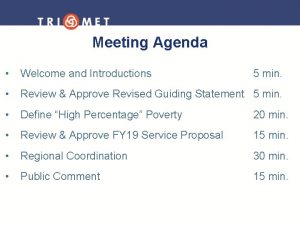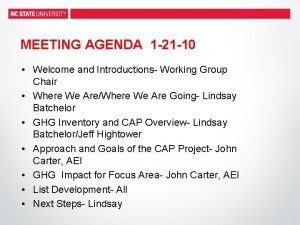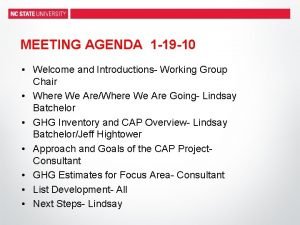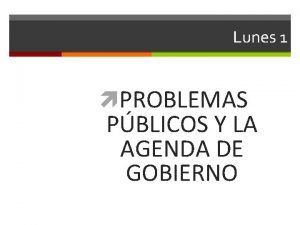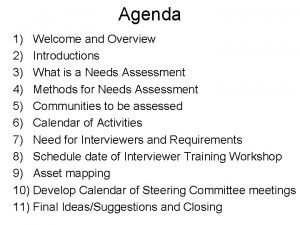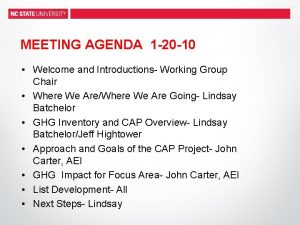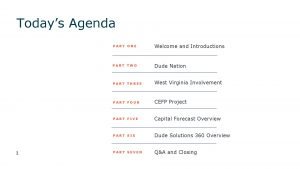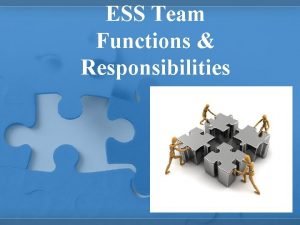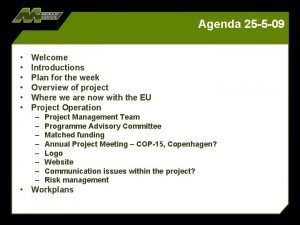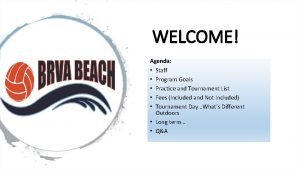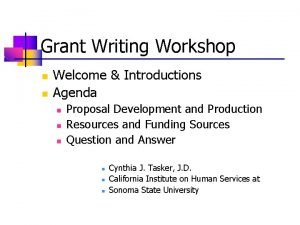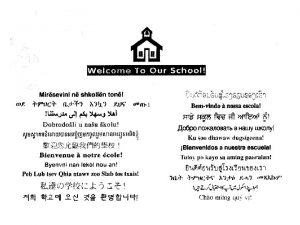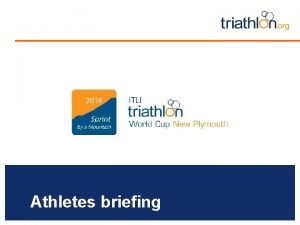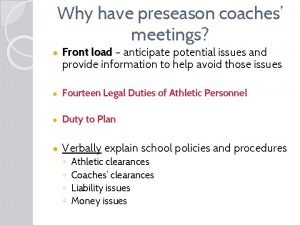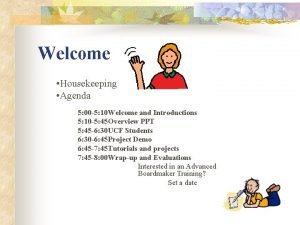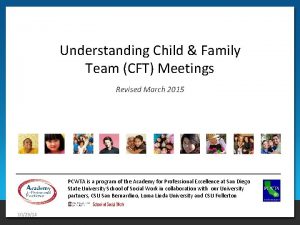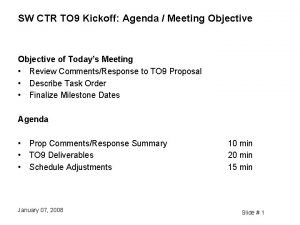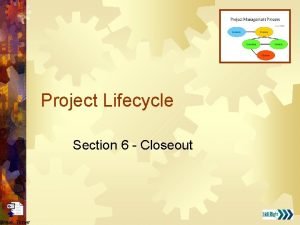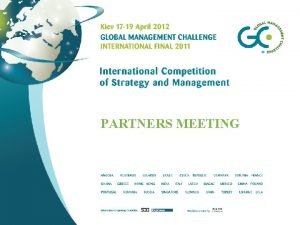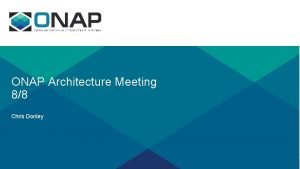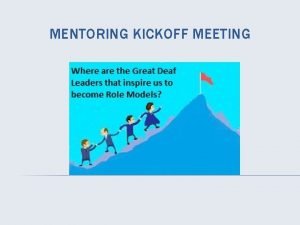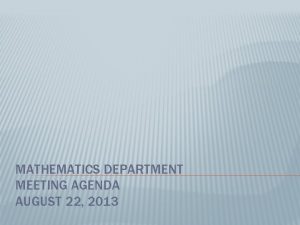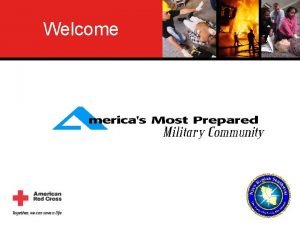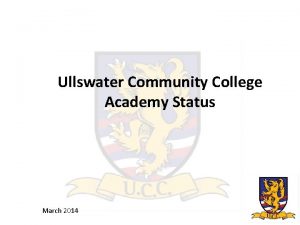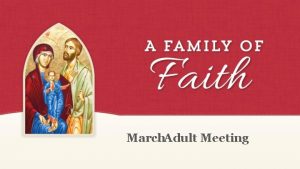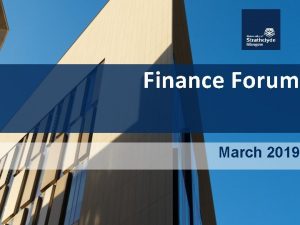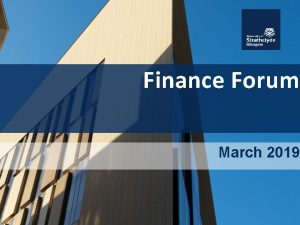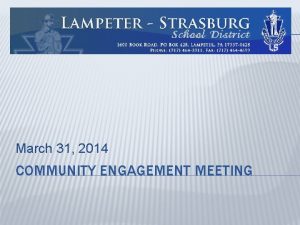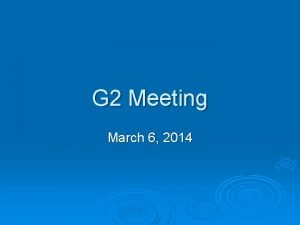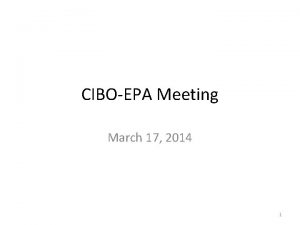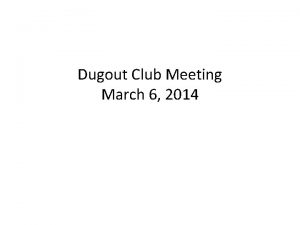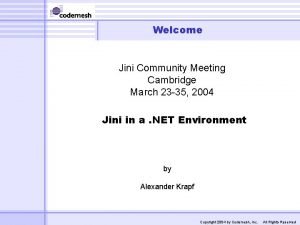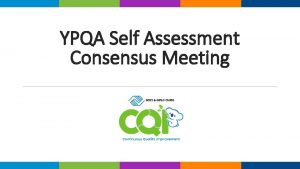Community Meeting March 24 2014 Meeting Agenda Welcome




























- Slides: 28

Community Meeting March 24, 2014

Meeting Agenda • • • Welcome Introductions Overview Master Plan Process Overview Existing Conditions Facilitated Discussion: Issues and Opportunities • Next Steps and Close • Adjourn

Master Planning Process

Add vicinity map here Wilderness Area Project Vicinity

Master Plan Goals 1. Preserve sensitive environmental resources; 2. Manage for visitor capacity; 3. Minimize impacts to the surrounding neighborhoods; and 4. Fully engage interested parties, users and the community at large in the planning process

Scope of Work • • • Task 1: Review Existing Documentation Task 2: Public Engagement Plan Task 3: Inventory of Existing Conditions Task 4: Carrying Capacity Task 5 a: Environmental Baseline Task 5 b: Resource Mgmt Plan

Scope of Work, continued… • • Task 7: Task 8: Task 9: Task 12: Usage, Amenities & Operations Parking Evaluations and Options Site Maps Final Master Plan Preparation


Technical Advisory Committee • TAC Membership includes: – 2 members at large – 1 Chair of Planning Commission – 1 Chair of Community and Health Services Commission – 1 member Claremont Wildlands Conservancy – 1 member Claremont Hills Conservation Corporation – 5 neighborhood/HOA representatives

Technical Advisory Committee • Purpose is to provide feedback into the public engagement process and input on specific issue areas. • 11 -person ad hoc committee comprised of diverse interests and backgrounds. Each person represents interests of their group/organization.

Opportunities for Input • Attend community or TAC meetings • Participate in online or visitor intercept survey • Communicate with a TAC member • Email: chwildernessplan@gmail. com

Historical Background

1900 -1950 • Johnson family owns and uses Johnson’s Pasture for picnicking and hiking. • The hillsides also used for agriculture, irrigation, and recreation. Gale Ranch was used to raise goats for mohair. • College students hiked in the hills from 1800’s to present.

Initial Protection Efforts • 1975: Acquire 40 acres from the Claraboya developer. • 1989 -1997: Garner Family donates 1440 acres to Pomona College, City annexes eastern foothills and negotiates with Pomona College. • 2003 -2005: City awarded state grants to purchase the Rancho de Los Amigos, Claremont Mc. Kenna College, and Wang properties.

Recent Protection Efforts • 2006 -2007: General obligation bond issued to acquire Johnson's Pasture, Supervisor Mike Antonovich awards Proposition A Excess Funds, City funds added, Johnson's Pasture added. • 2011: Rivers and Mountains Conservancy and the Wildlife Conservation Board split cost of acquiring Gale Ranch and contribute it to the Wilderness area.

Growing Visitor Use • 2011: Estimated use more than 300, 000 visits annually. • 2013: City establishes park hours and parking policies. • 2014: City begins the Master Planning process.

Existing Conditions

Wildfire History • Wilderness area and surroundings a fire prone environment. • 6 documented wildfires since 1989. – Padua (Grand Prix) – Williams – Mills – Sycamore – Webb – Amarillo Tank

Claremont Hills Wilderness • More than 2, 000 acres (including Sycamore Canyon Park) • Adjoins other protected areas • Headwaters for multiple streams • Multiple habitats: – Mixed coastal sage-chaparral scrub – Riparian oak woodland – Ruderal grasses

Sensitive Habitats and Plants

Large Mammals

Preliminary Planning Issues – Stewardship • RMP, environmental analysis of use levels, unofficial trails – Sanitation and Safety • Etiquette, signage, restrooms, rest areas, steep bike trails – Balance between resource protection & use • Number of visitors & neighborhood impacts + hillside conservation • Types of users: hikers & bikers and occasional horse riders • Hours of operation: expanded or reduced, nighttime options • Enforcement? – Equity • For all interested parties – Education – Other Issues?

Process Recap

Project Milestones • Project launch January 2014 • Tasks Completed January – November 2014 • Committee, Commission, Council Review – December 2014 • Plan Adoption – January 2015

Meeting Schedule • TAC Meetings – – Meeting 1: March 6 Meeting 2: May 19 Meeting 3: July 14 Meeting 4: October 6 • Community Meetings – Meeting 1: March 24 – Meeting 2: July 21 – Meeting 3: October 20

Facilitated Discussion

Format and Guidelines • Facilitated Discussion – Issues and Opportunities – Key Themes • Oral Comment: 3 -minute maximum per comment • Written Comment: Comment Card or Charts

Format and Guidelines • Maintain mutual respect the views of others • Wait to be called on by facilitator • No interruptions
 Agenda welcome and introductions
Agenda welcome and introductions Meeting agenda welcome and introductions
Meeting agenda welcome and introductions Agenda welcome and introductions
Agenda welcome and introductions Meeting agenda welcome and introductions
Meeting agenda welcome and introductions Anthem of poland
Anthem of poland Agenda sistemica y agenda institucional
Agenda sistemica y agenda institucional Agenda welcome and introductions
Agenda welcome and introductions Agenda welcome and introductions
Agenda welcome and introductions Uhhshare
Uhhshare Agenda welcome and introductions
Agenda welcome and introductions Ess
Ess Agenda welcome and introductions
Agenda welcome and introductions Welcome agenda
Welcome agenda Agenda welcome and introductions
Agenda welcome and introductions Agenda welcome and introductions
Agenda welcome and introductions Agenda welcome and introductions
Agenda welcome and introductions Agenda welcome and introductions
Agenda welcome and introductions Preseason coaches meeting agenda
Preseason coaches meeting agenda Housekeeping meeting agenda
Housekeeping meeting agenda Football meeting agenda
Football meeting agenda Cft meeting agenda
Cft meeting agenda Meeting objective
Meeting objective Graduation meeting
Graduation meeting Iep meeting agenda
Iep meeting agenda Project close out meeting
Project close out meeting Introductory meeting agenda
Introductory meeting agenda Architecture meeting agenda
Architecture meeting agenda Sample agenda for mentor meeting
Sample agenda for mentor meeting Math department meeting agenda
Math department meeting agenda
